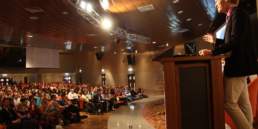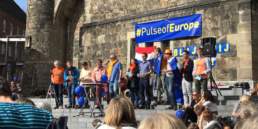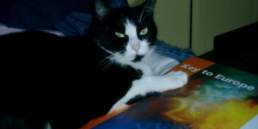David Stulík (40) was one of the best-known faces in AEGEE in the 90ies. Not only because he was speaker of the East-West Working Group (EWWG) and CD member, but rather because of the enormous enthusiasm that he was. His passion for AEGEE and his creativity inspired a whole generation of members. Today he works for the EU delegation in Kiev. In a series of articles about the East expansion of AEGEE in the 90ies, the AEGEE Golden Times asked David about his time as EWWG speaker.
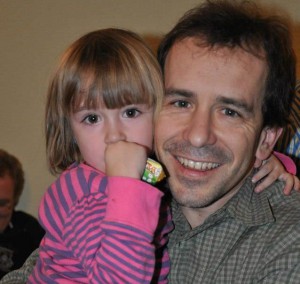 Golden Times: When did you hear about AEGEE for the first time?
Golden Times: When did you hear about AEGEE for the first time?
David Stulík: It was in 1991 when I started my studies at the Warsaw School of Economics. I was elected as the students’ representative to the university self-government. After some time, some of my friends from the same study year approached me and proposed to represent there a brand-new students’ NGO, which is present all over Europe. By then, I was representing a legendary and famous Independent Students’ Union (NZS) at the self-government, which used to be a students’ wing of Solidarnosc. I eventually “defected” to AEGEE, since its ideas and principles were much more appealing to me. AEGEE was the future, while the NZS was a glorious past.
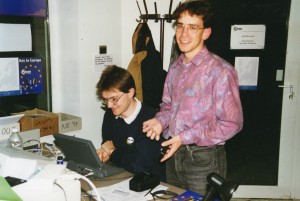
Golden Times: When you joined AEGEE in 1991, was AEGEE already everywhere in the East? Or was the network still developing quickly?
David: No, it was not everywhere, but mainly in Central Europe: Czechoslovakia, Hungary, Poland, Slovenia. We had been slowly moving further to the East and the North East, the Baltic states. Indeed, there were too many new contact groups being established in the former USSR, so we hardly followed their development. And, unfortunately, some of them had a short life. After their founders left to the West, their local branches of AEGEE were dead.
Golden Times: You joined AEGEE’s East West Working Group and became their speaker. Which role did the EWWG play in the East expansion of AEGEE?
David: The EWWG was the icebreaker. It was establishing first contacts with young people behind the former Iron Curtain as of 1990. The EWWG was a frontrunner, it created many outposts in Eastern and Central Europe and managed to establish solid and sound fundaments of AEGEE much earlier than the EU or the Nato. It had been a real blitzkrieg, immediate offensive, which did not meet any hesitance. On the contrary, the youth in the former Soviet bloc was simply waiting for such NGOs to be present there. It perfectly and fully corresponded to their natural and legitimate expectations and visions.
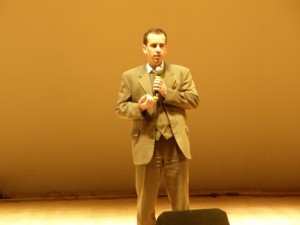
Golden Times: What did you achieve as EWWG speaker?
David: My predecessors – like Michael Merker – should be praised for all of these achievements. When I was speaker from 1993 to 1995, I managed to keep this group together for some time and move its scope of interest further to the East, to the former USSR. But in those years all that expansion work was already done.
Golden Times: In September 1995, you organised the legendary Case Study Trip (CST) Ukraine. Which impact did the event have for AEGEE in Ukraine?
David: AEGEE was already there in that year. We had a full-fledged antenna in Lviv, which was our best contact and the most helpful and reliable one, and also one in Kyiv. But when we arrived in Kyiv and where in the hands of local “bosses” of AEGEE, we soon realised that we had been sort of cheated by them. They were running AEGEE as a company, they were renting apartements for themselves in the city centre, which had been paid from membership fees. They were charging a small personal fee for each visa gained for own members by the member states of the European Community consulates, which were issuing visa for AEGEE members quite flexibly.
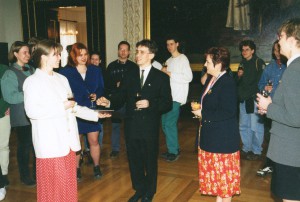
Golden Times: That’s bad. What did you do about this abuse?
David: We realised that AEGEE ideas and ideals could be misused. And we had to explain local members in Kyiv, but also in Zaporyzhiya, that real democracy and “the West” are about something else. The EWWG then instigated new elections of the board in Kyiv right after the CST and our EWWG representative went there as an observer. Thus, we managed to push out these guys and allow normal people to take charge of matters in AEGEE-Kyiv.
Golden Times: You work in Kiev now. Which impression do you have of AEGEE-Kyiv today?
David: When I meet people from AEGEE-Kyiv nowadays, I am so happy that we intervened back then! Because this generation of young people is the same one like any youngsters in any other European country.
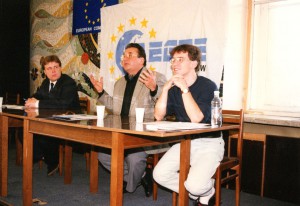
Golden Times: Were there cases of power abuse in other locals?
David: There were more, but it was rather an easy task to discover the real motivation of such people.
Golden Times: In your time there were always discussions about the borders of Europe. How do you remember that?
David: Frankly speaking, I have rather vague memories. I have been always following one principle determining where the boundaries of Europe are: they are not geographical ones, but mental ones. Those, who consider themselves to be European in their minds – values, behaviour, based on the common and shared historical experience – they have the full right to be a part of Europe. Those, who live to according other principles, have nothing in common with European civilisation. You can find many so-called Europeans in EU countries, who do not live according to such principles too! So I have been always looking into individual people and rather not at countries or societies as such when determining or defining how European these are.
Related Posts
1st August 2019
The Gallery of All Presidents of AEGEE-Europe
Here is the gallery of all Presidents of AEGEE-Europe - with photos of every one of them. Enjoy the list!

